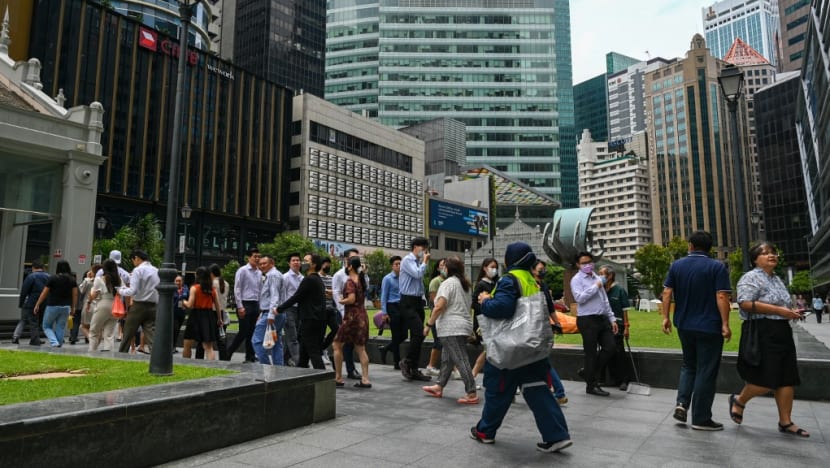Global trade tensions and shifts could benefit Singapore, but uncertainties remain in 2025: Analysts
Singapore's growth forecast for 2025 is projected to slow to between 1 and 3 per cent, lower than the 4 per cent growth last year.


This audio is generated by an AI tool.
SINGAPORE: Singapore is set for a more challenging growth outlook this year, after ending 2024 on a strong footing, analysts said.
Singapore's growth forecast for 2025 is projected to slow to between 1 and 3 per cent, lower than the 4 per cent growth last year.
Significant downside risks to the outlook include geopolitical tensions, an anticipated slowdown in China, and uncertainty in the United States when President-elect Donald Trump takes office, the observers added.
But they highlighted bright spots in trade-related services and the manufacturing sector.
GLOBAL ECONOMIC UNCERTAINTY
Analysts said Singapore could well benefit from trade flows into Southeast Asia amid the uncertain global landscape and trade tensions between the US and China.
The global shift from a just-in-time model to a just-in-case model is likely to be beneficial to Singapore, said Mr Jeff Ng, head of Asia macro strategy at SMBC.
“There are more production centres, diversified across Asia, rather than having most of the production concentrated in one or two locations. So this will mean that locations like Singapore are relatively attractive because of its proximity to other growth centres in the ASEAN (Association of Southeast Asian Nations) region,” he noted.
However, trade could also be curtailed with incoming US President Trump’s tariff threats, Mr Barnabas Gan, acting group chief economist at RHB Bank, told CNA’s Singapore Tonight on Tuesday (Jan 14).
Dr Sumit Agarwal, professor of finance, real estate and economics at the National University of Singapore Business School, highlighted trade zones, such as the Johor-Singapore Special Economic Zone, that could help attract foreign direct investments and technology transfers.
UNCERTAINTIES IN INFLATION
Uncertainties could also change the course of inflation, which is expected to continue easing this year.
Both core and headline inflation are expected to come in between 1.5 and 2.5 per cent.
Mr Gan noted, however, that there remains “very strong uncertainties over the global front”, such as potential trade sanctions by the US. These factors could cause inflation to pick up sharply, he added.
At the same time, the labour market this year is expected to remain strong with wages expected to grow.
This could result in price increases, said Dr Sumit. When workers get a wage hike, they may demand more goods which in turn causes prices to rise.
Analysts expect more job vacancies but with global uncertainties, layoffs could also go up.
On the upcoming Budget, which will be delivered by Prime Minister and Finance Minister Lawrence Wong on Feb 18, Mr Gan believes it would likely offer more support to tackle cost of living issues and strengthen the social compact.
POLITICAL SHIFTS
Amid increased global competition, Singapore has to tread carefully, said trade and economic policy expert Deborah Elms.
This includes some ASEAN states joining BRICS, an alliance of major developing countries, including China and India. The grouping is often seen as a counterweight to Western-led institutions.
“Singapore, which sees itself as an important fulcrum between a lot of these big players, is going to have a much harder time going forward with that balance,” noted Dr Elms, head of trade policy at philanthropic organisation Hinrich Foundation.
The country also has to consider how it lines up with other Asian economies, said Dr Elms.
“I think it's getting much more complicated and faster than most people expected.”
Singapore, on its part, has sought to bolster its economic ties with several countries. Already, it has signed 27 free-trade deals both within and outside the region.
It has also maintained its position in multilateral trade pacts such as the Regional Comprehensive Economic Partnership (RCEP), which promises reduced tariffs amongst member countries.
MANUFACTURING SECTOR A BRIGHT SPOT
Amid the headwinds, Singapore’s manufacturing sector is expected to be a shining light with continued robust growth this year, driven by a demand for chips used in computers, smartphones, and artificial intelligence devices.
AI technology, in particular, has been increasingly implemented to raise productivity and improve growth prospects.
AI Singapore, a national programme set up to enhance the country's AI capabilities, told CNA that interest in the technology has grown “tremendously”.
At Chinese specialty store chain Yue Hwa, for instance, a customised AI solution has helped to reduce the time needed for each department to come up with the work roster.
“We spent a good six months looking for a good rostering solution,” said Mr Jacob Yu, director of Yue Hwa Chinese Products.
“But over this six-month period, we identified that a lot of the ready-made (rostering) package solutions do not cater for individual staff preferences, nor do they have the machine learning aspect to understand the different shifts and roles for individual staff.”
The Singapore Business Federation (SBF), the country’s apex business chamber, is looking to develop AI solutions that can help companies solve common problems.
It hopes the strategy can bring big productivity gains in the future.
“For the large companies that are already going for the bespoke build, I think those gains will be quite clear and will be quite significant,” said Mr Lee Yee Fung, chief smart technologies and sustainability officer at SBF, referring to customised solutions.
“Our challenge is, how do we percolate this down to the broader group of companies that is beyond individual productivity gains.”




















